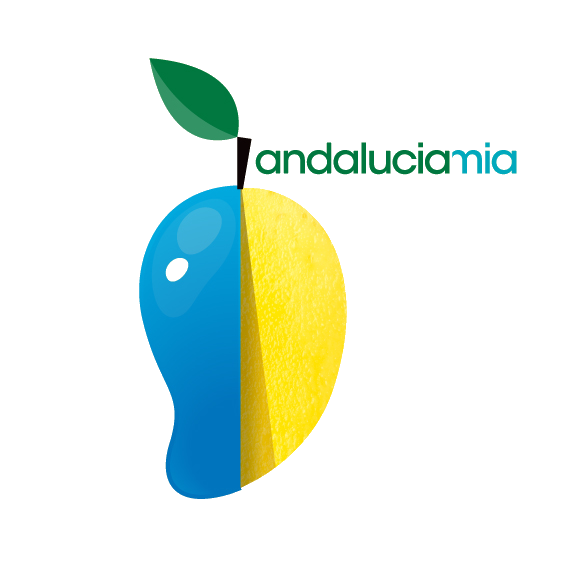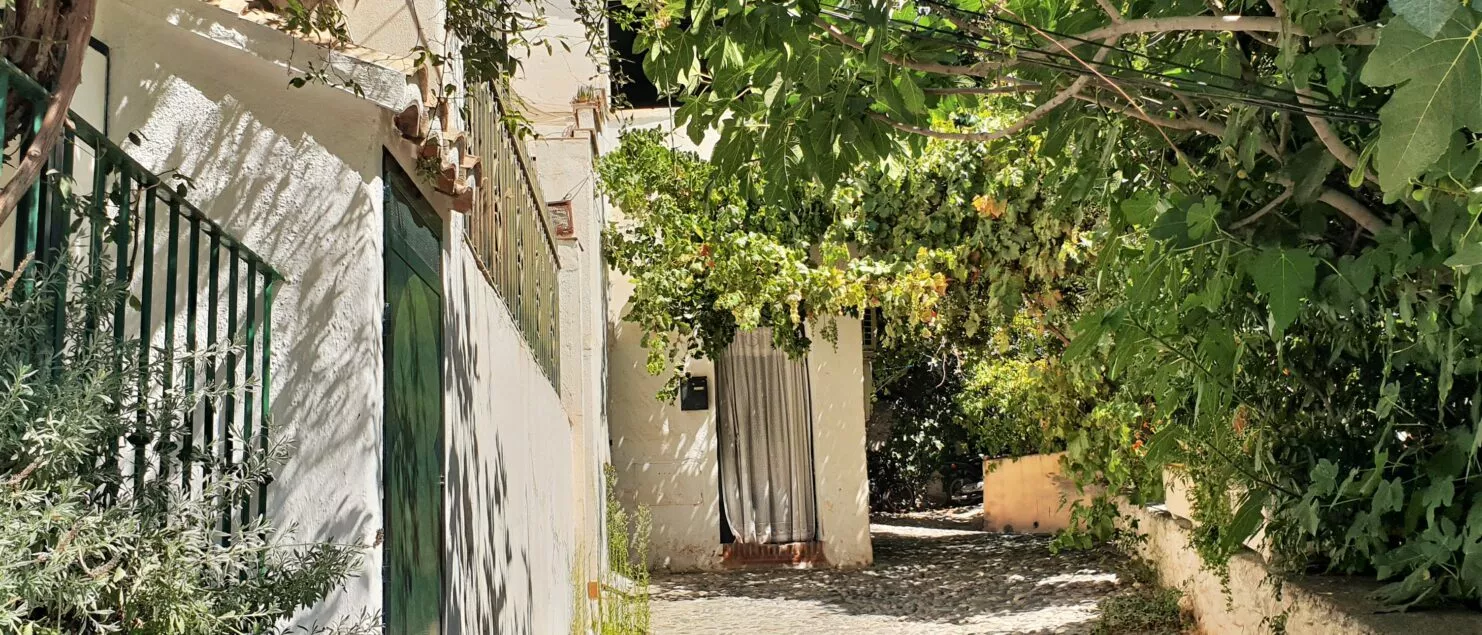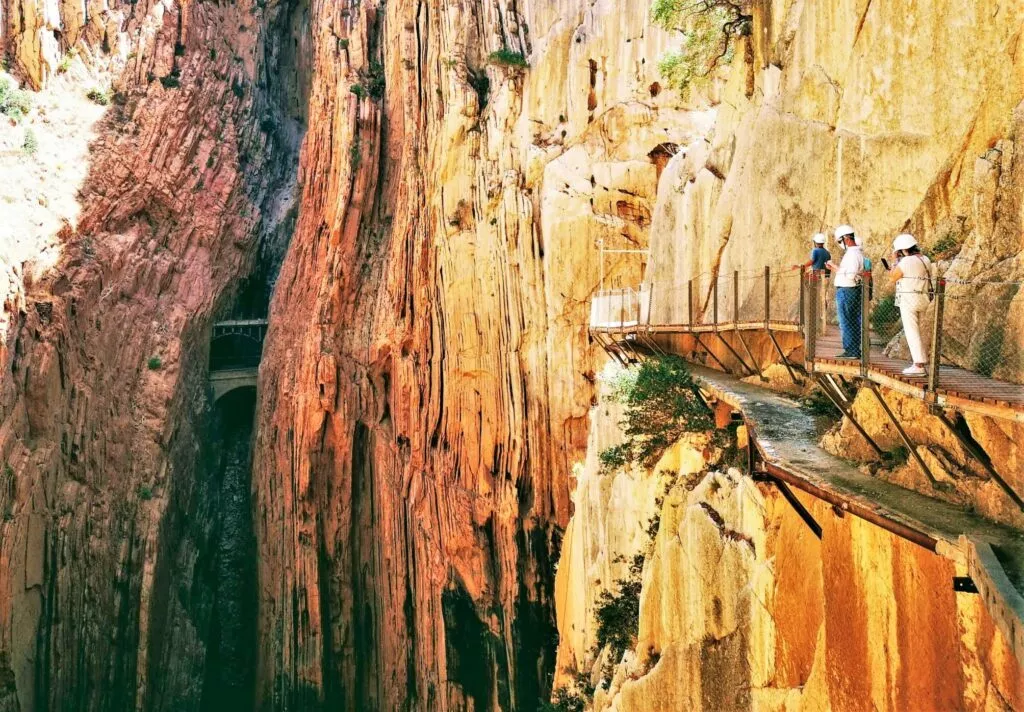The caves of the Sacromonte district of Granada
Visit the Sacromonte neighbourhood with its caves in Granada
In this article you will find the essential information on the best caves and things to see in the gypsy quarter of Sacromonte in Granada :
- The origins of the Sacromonte district
- Where is the district in Granada?
- Caves and other things to see in the Sacromonte of Granada?
- Where to see a flamenco show in a cave house in the Sacromonte?
- What to do in Granada?
- Finding accommodation in Granada
- Some useful links (rent a car, other ideas for visits)
The origins of the Sacromonte neighbourhood of Granada
The Sacromonte neighbourhood is known as the gypsy neighbourhood of Granada and as the birthplace of the Zambra in cave houses.
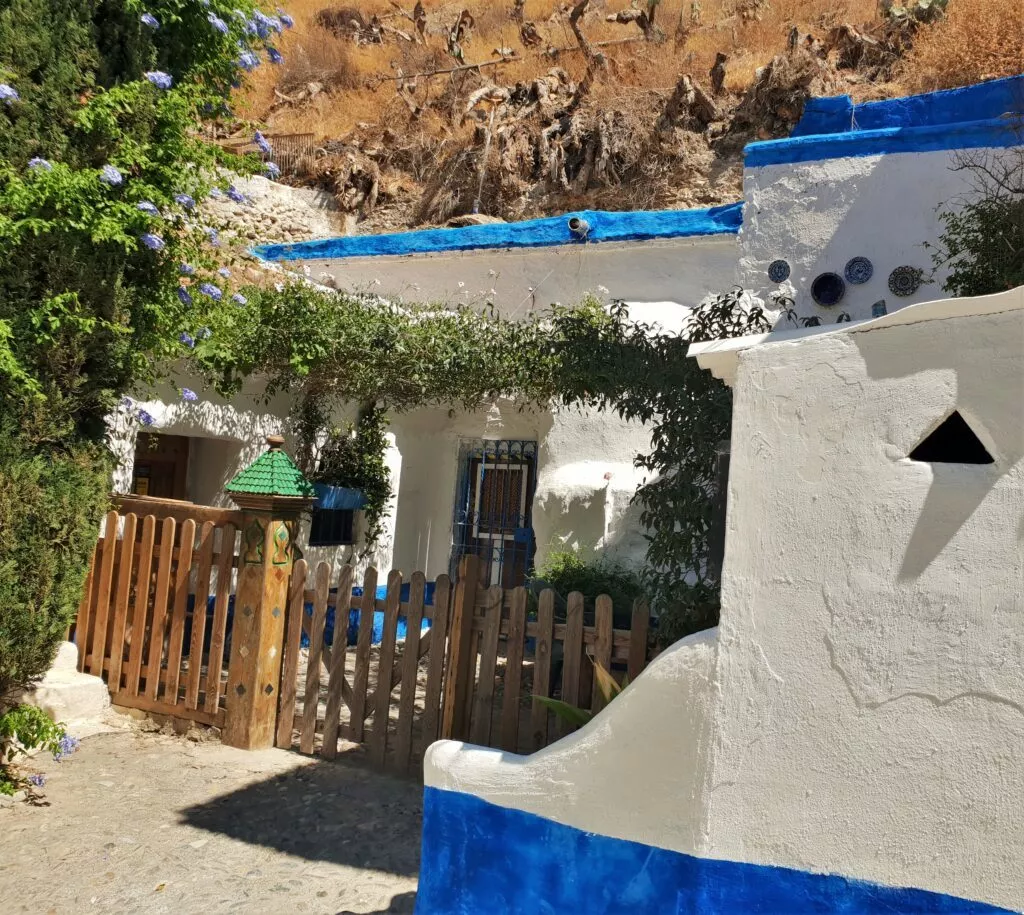
This neighbourhood was born in the 15th century when a group of gypsies settled on the Valparaiso hill. The gypsies built many troglodyte dwellings in the rock.
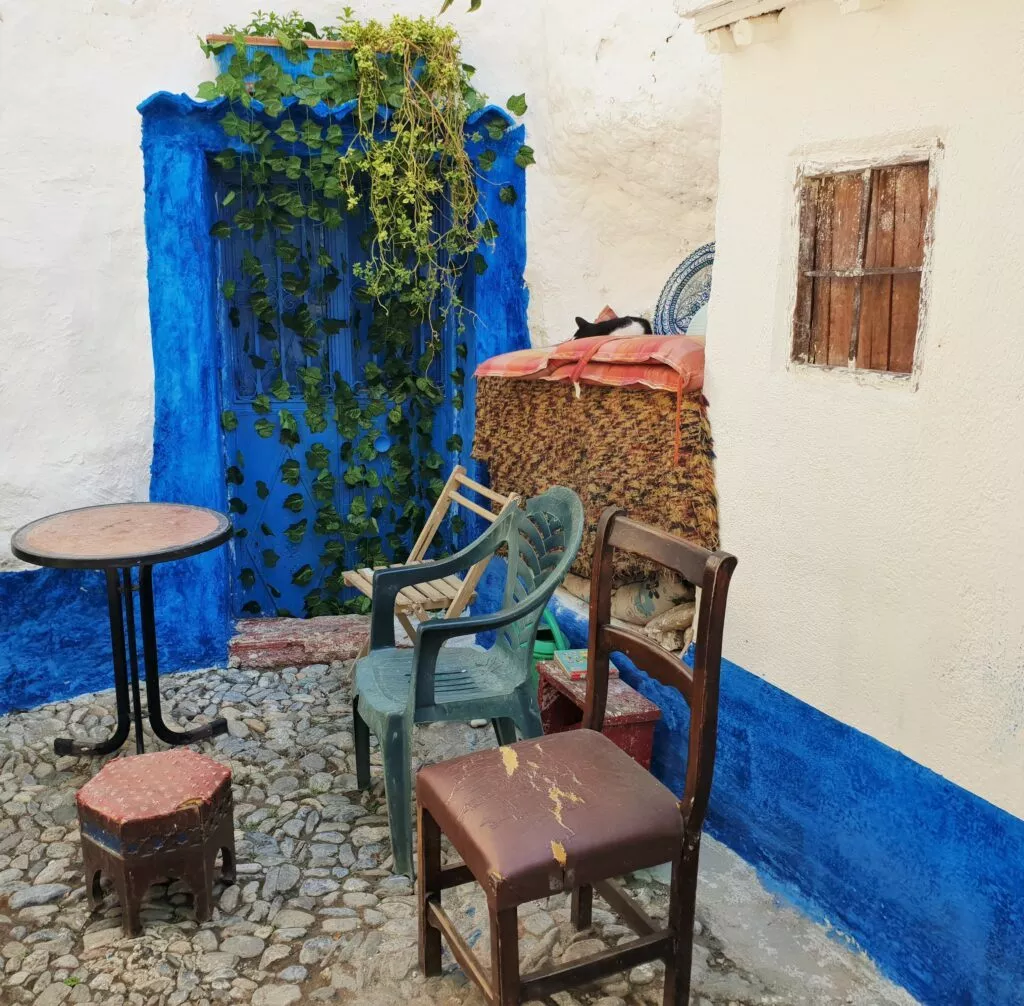
In the same century, gypsies found the remains of the patron saint of Granada, San Cecilio. It was this event that gave the hill the name Sacromonte, which literally means “sacred mountain” in Spanish.
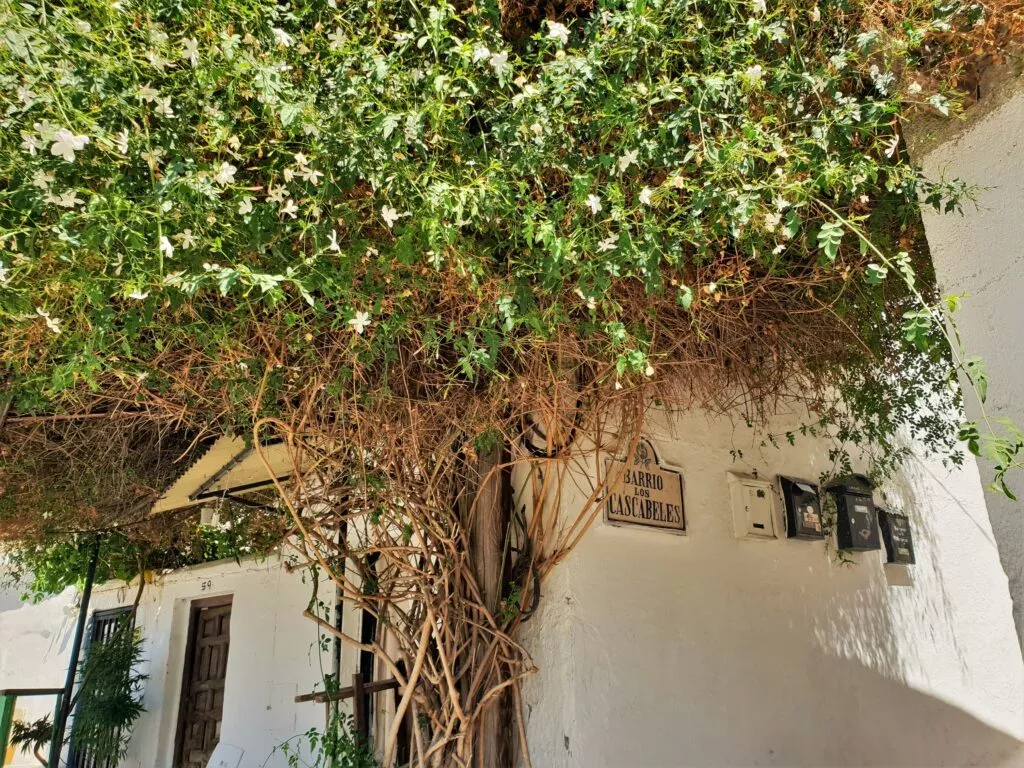
This area is also known as the cultural centre of the gypsy community and in particular of a style of flamenco. This is known as zambra, zambra flamenca or zambra mora. It is a mixture of traditional flamenco with sounds and dances (sometimes close to belly dancing) of Arabic origin.
Every evening several flamenco shows are given in some of the Sacromonte’s cave-houses.
Where is the Sacromonte district in Granada?
The Sacromonte in Granada is located on the hill of Valparaiso. It is right next to the historic Arab quarter of the Albaicin. It is also opposite the Alhambra.
From the centre of Granada, the easiest way to get there is to take the C2 bus, which is located in the Plaza Nueva. In less than 10 minutes you will be in the heart of the district. This neighbourhood is the perfect complement to your visit to the best sites in Granada.
Here is the area surrounded by red dotted lines, it is possible to zoom in on the map.
What to see in the Sacromonte of Granada – caves and other things
- Cuevas del Sacromonte Museum
- Sacromonte Abbey
- the abbey’s catacombs
- The viewpoint of the Sacromonte Abbey
- Museum of Gypsy Women
- Viewpoint of the Vereda de Enmedio
- The Zirid Wall
- a flamenco show in a cave house :
- museo de la zambra
- Venta el Gallo
- Cueva de la Rocio
- Cueva de los Tarantos
Cuevas del Sacromonte Museum
This museum is located in the centre of the district at the “Barranco de los negros”, the ravine of the blacks. The name of this ravine comes from one of the many legends of the neighbourhood.
The visit to the “Cuevas del Sacromonte” museum takes you through 11 caves (troglodyte houses).
This ethnographic museum presents in these adjoining caves :
- history,
- traditions,
- the way of life,
- the inhabitants of the Sacromonte
- its natural environment
This museum offers online booking (about 5 euros) : Museo Cuevas del Sacromonte
The Abbey of Sacromonte
The Sacromonte Abbey (la Abadia del Sacromonte) is located at the top of the neighbourhood.
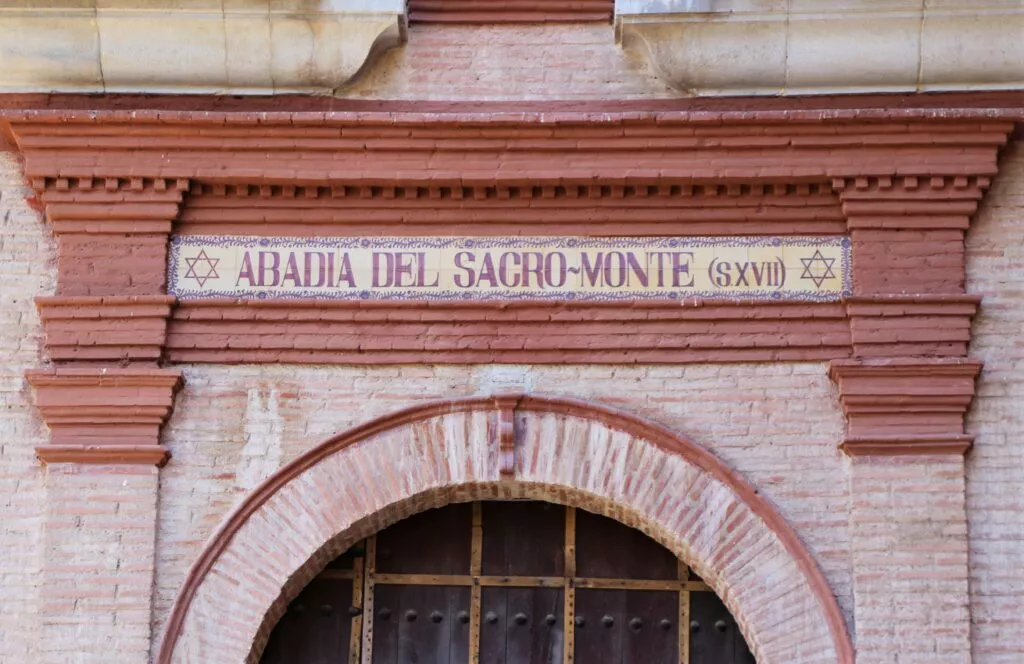
It owes its construction (17th century) to the discovery two centuries earlier, in this place, of the remains of the Patron Saint of Granada, San Cecilio.
A visit to the Abbey allows us to see
- The church, with a beautiful altarpiece
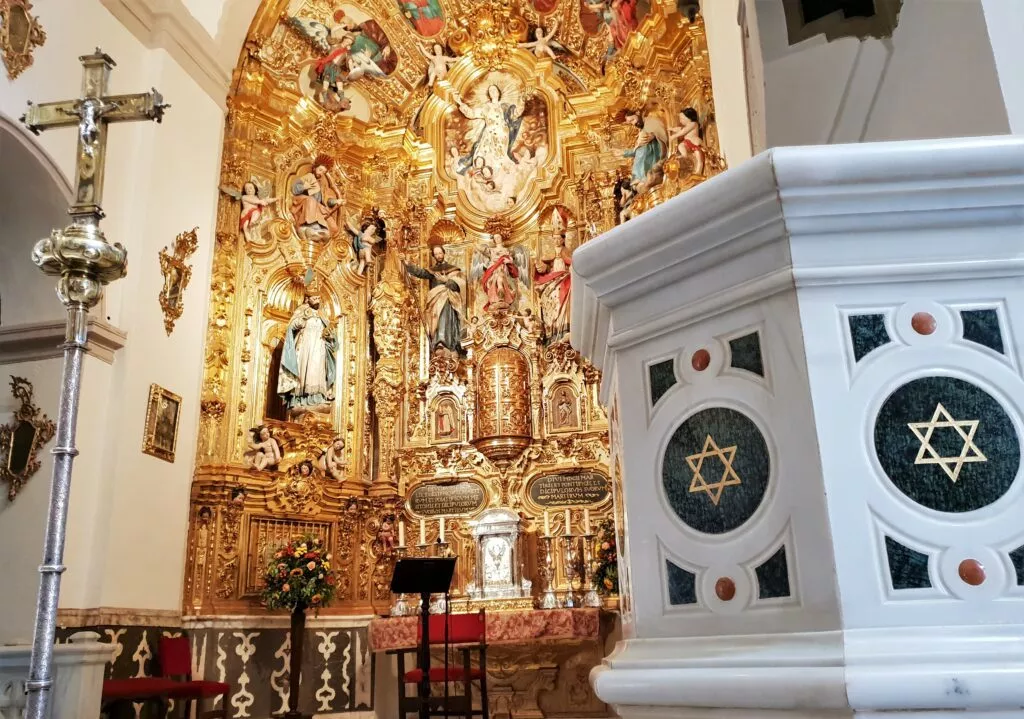
- The cloister of the abbey
- A museum with many treasures and very old books
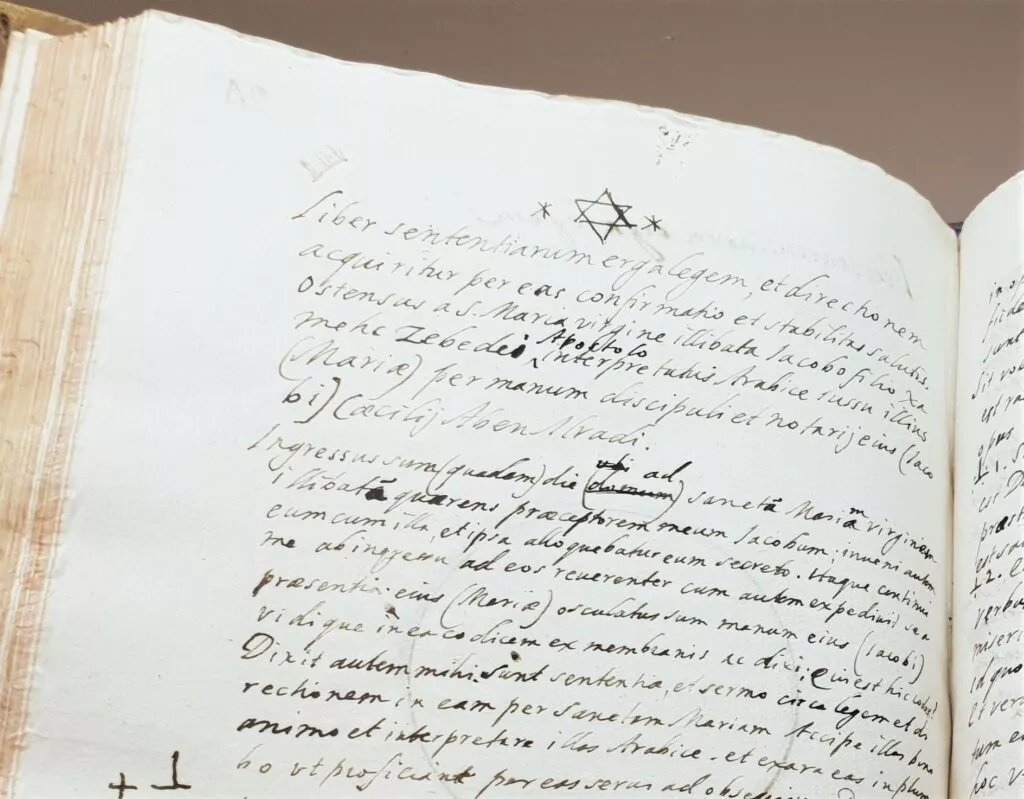
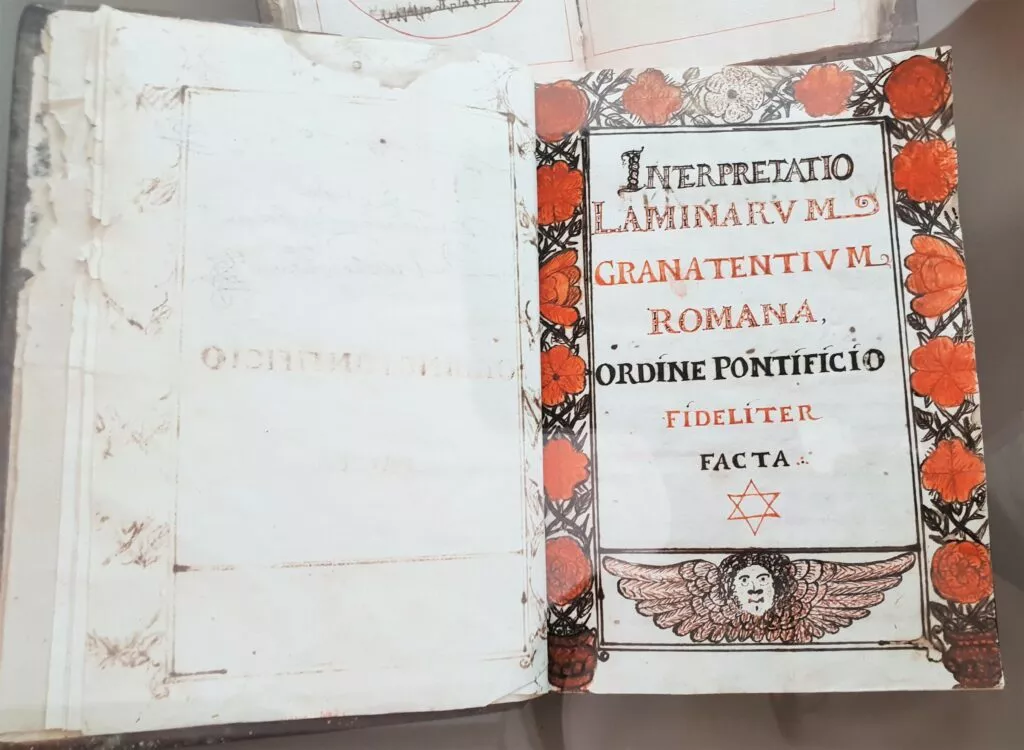
- In the museum of this abbey, there is the original of Averroes’ medical treatise and a map of the world by Ptolemy.
You can also see copies of the Sacromonte lead books on display. These books are at the origin of one of the greatest falsifications in history, dating back to the 16th century.
For the record, these famous lead books confiscated by the Vatican in the 17th century were returned to the city of Granada in June 2000….
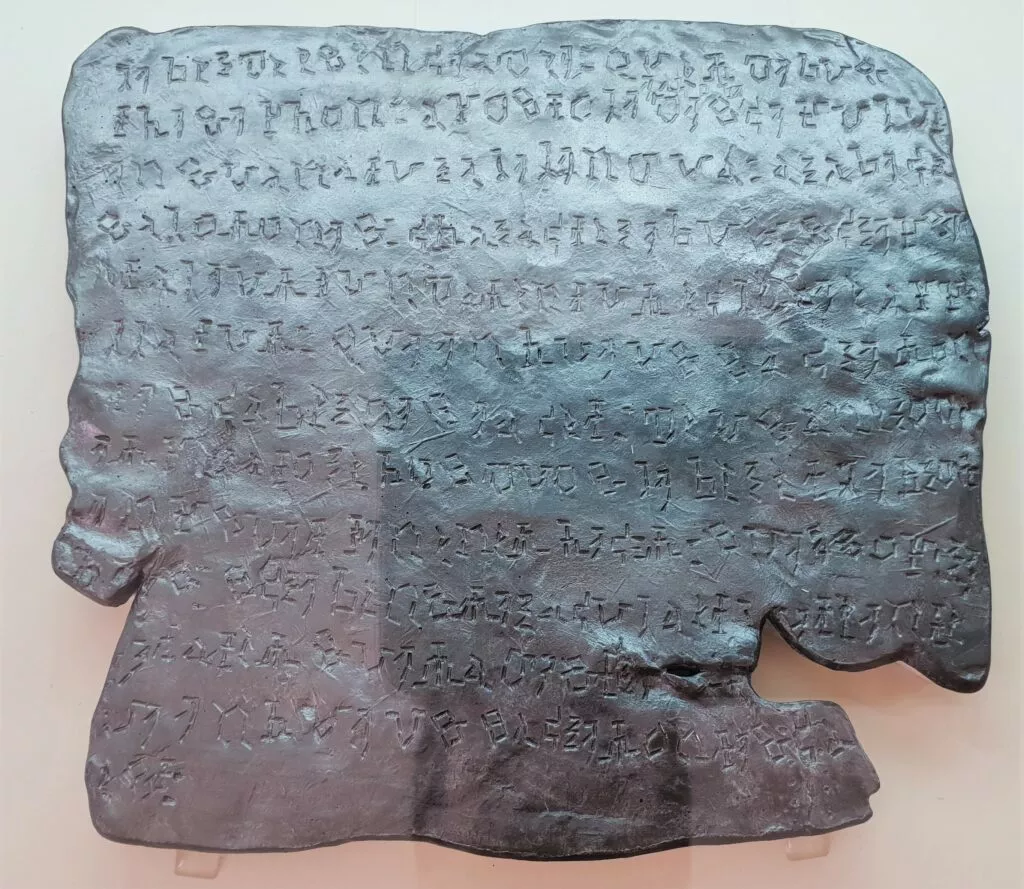
- Catacombs
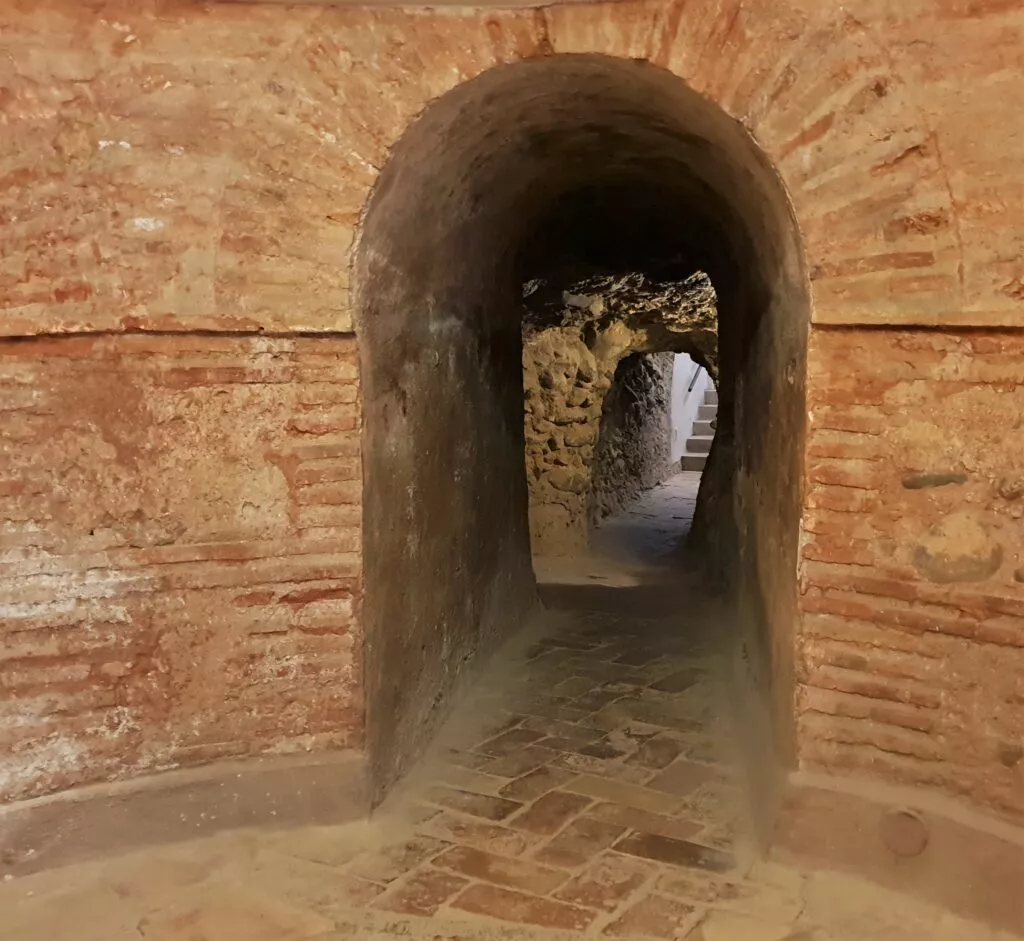
In the catacombs of the abbey there are several chapels carved into the rock. Here is one of them below:
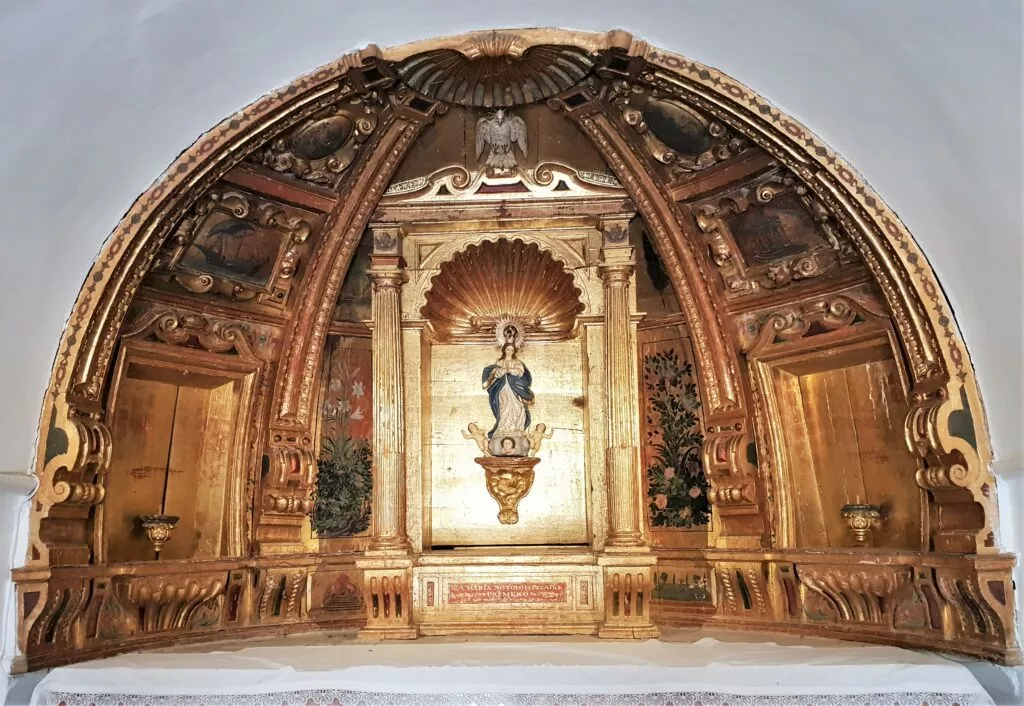
In one of them you can see the Christ of the Gypsies. It is this figure of Christ that is used during the procession of the Christ of the Gypsies. This procession takes place on Wednesday during Holy Week in Granada.
If you wish to book your visit in advance (5€ approx.): Abadia del Sacromonte ticket
The Mirador of the Sacromonte Abbey offers a magnificent view of Granada and the Alhambra.
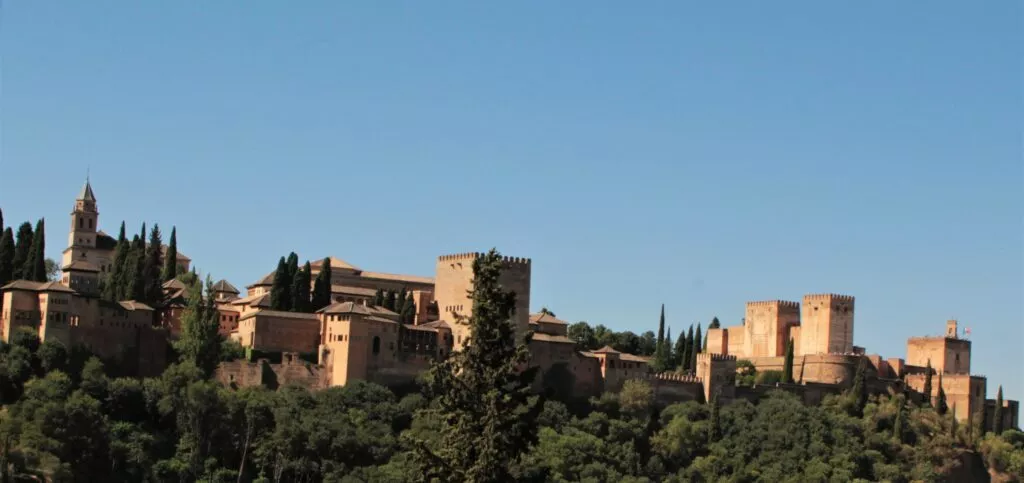
Museum of Gypsy Women (museo de la mujer gitana)
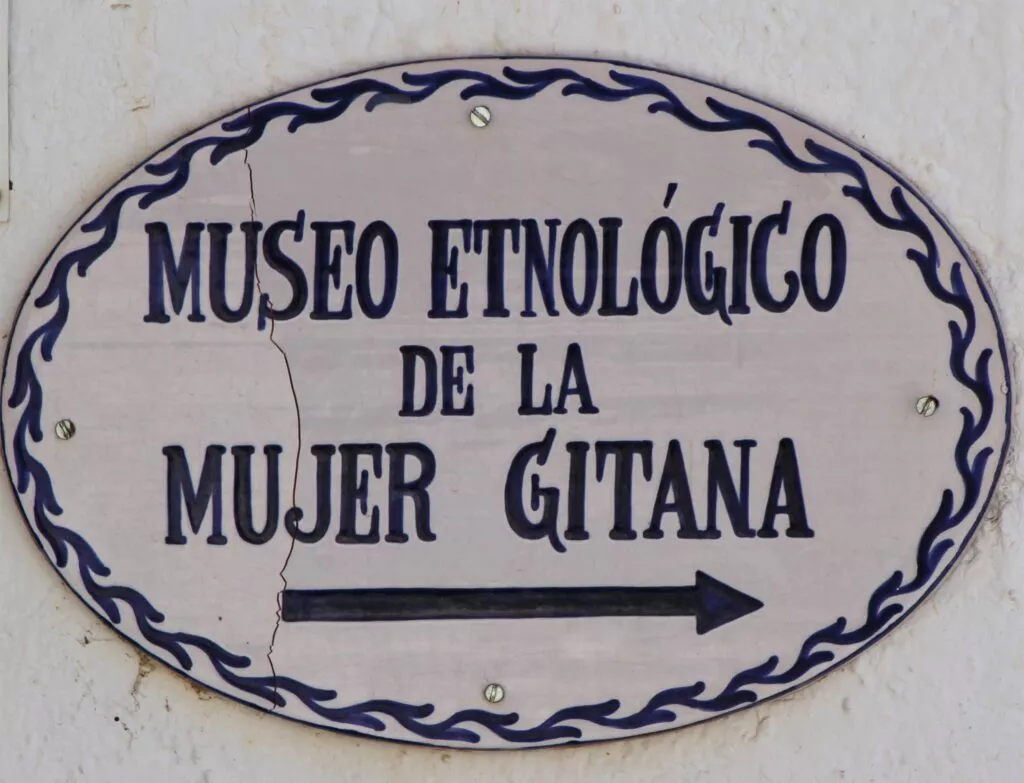
This museum is made up of 3 caves in which 3 themes are presented:
- Cueva de la Historia
- Cueva de Arte y Cultura
- Cueva ROMI
The viewpoint of the Vereda de Enmedio
This viewpoint, in the heart of the Sacromonte district, offers beautiful views of the Alhambra and the Zirid Wall! It offers a somewhat different view from the usual panoramas from Saint Nicholas Square.
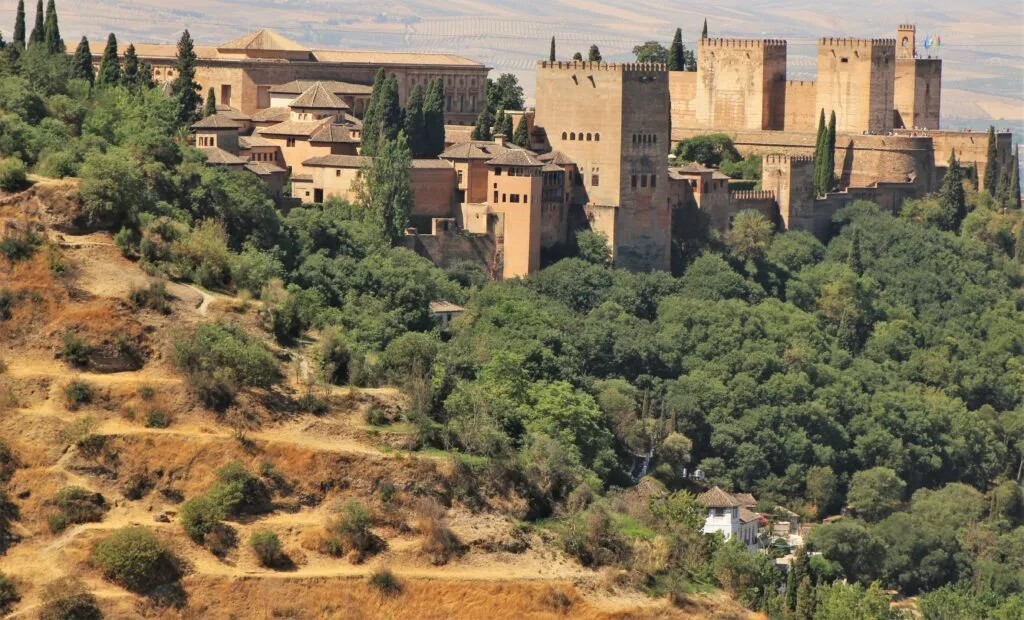
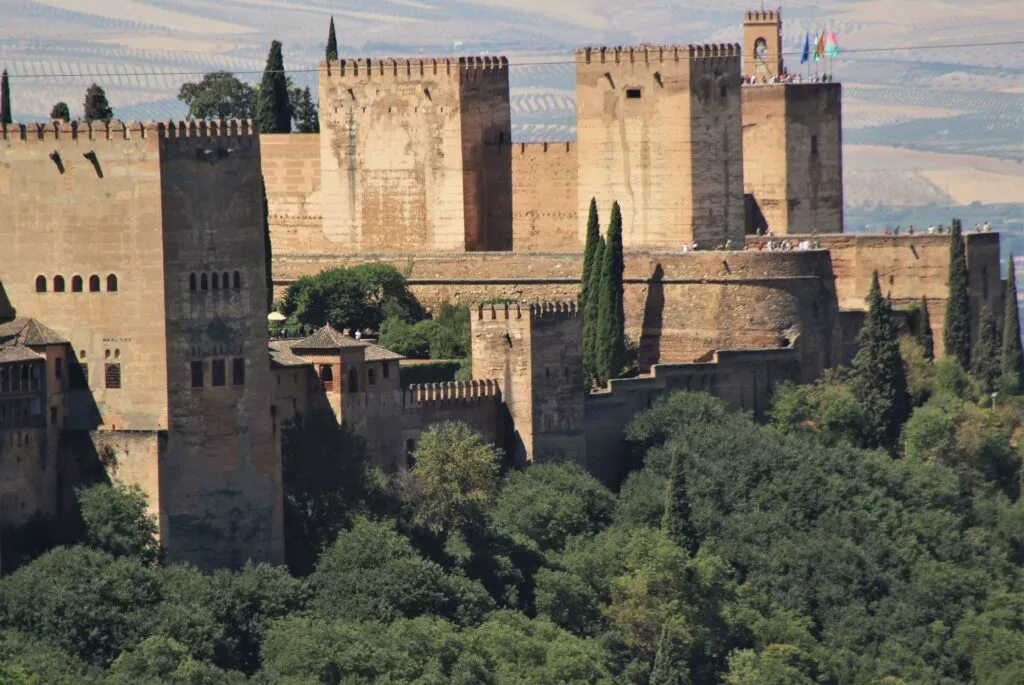
You can also see the Generalife: the palace and summer garden of the Nasrid kings.
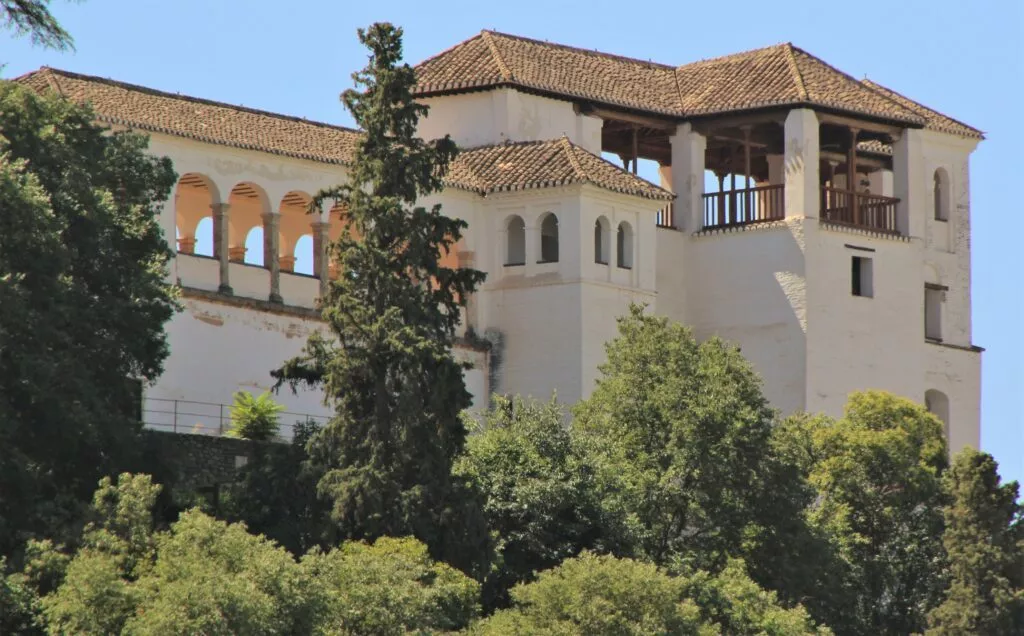
For the record: this viewpoint is also called Mario Maya. This is in honour of the famous gypsy dancer who started out in this neighbourhood.
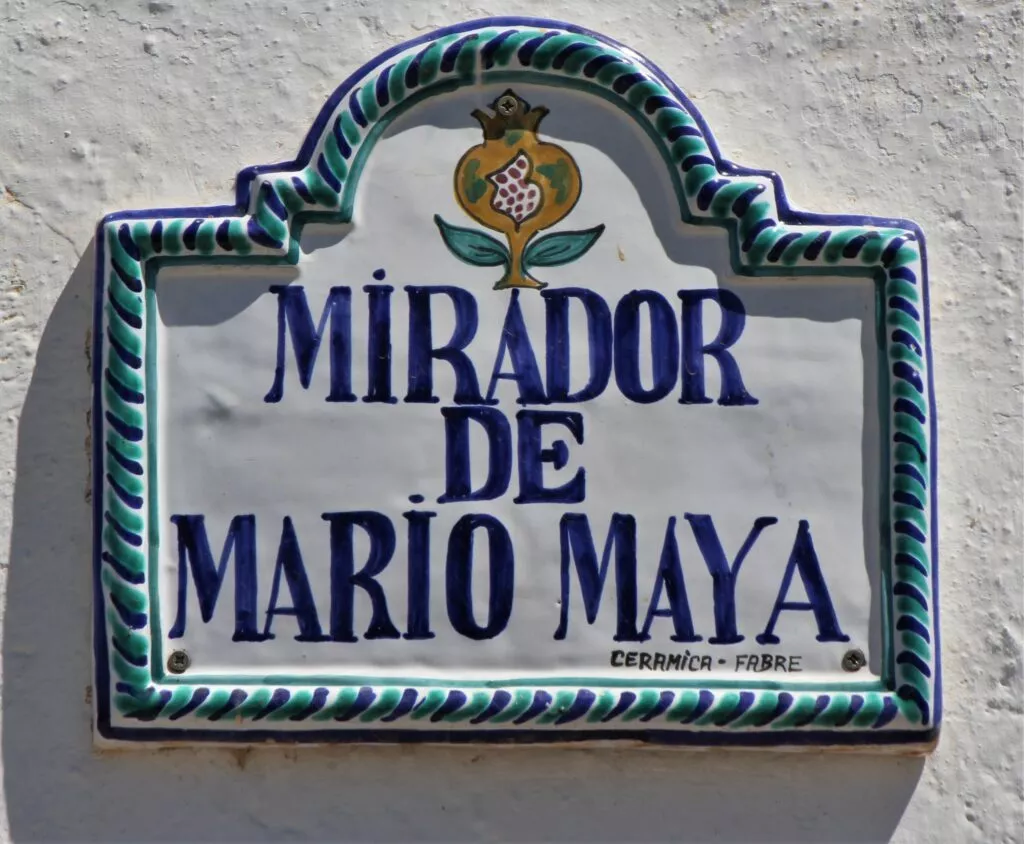
The Zirid Wall
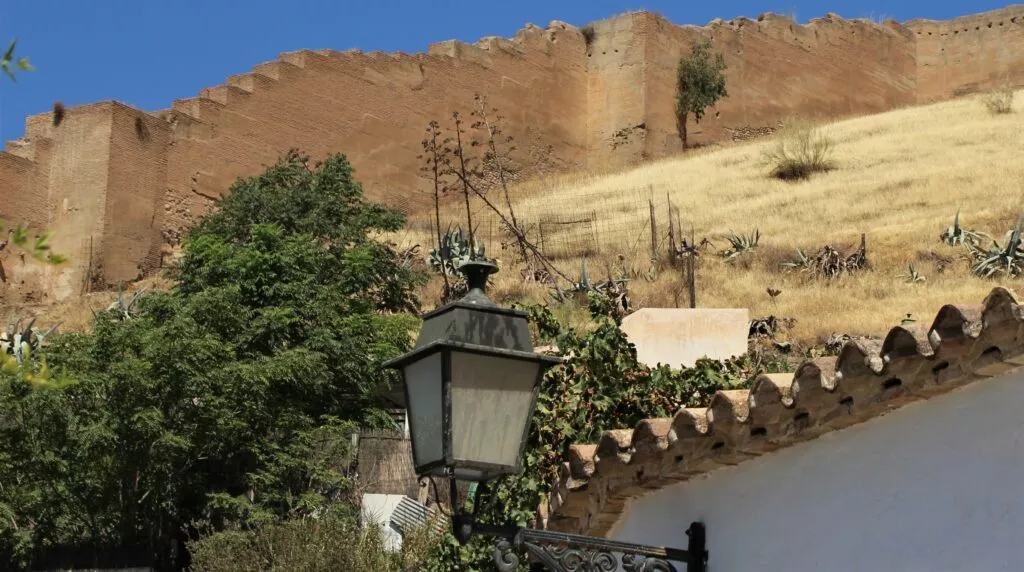
This wall was built by the Zirids in the 10th and 11th centuries to protect what was to become the historic district of Albaicin. At the time, it was used to protect the Cadima alcazaba (al-Qasba Qadima) where the palace of the Zirid kings was located.
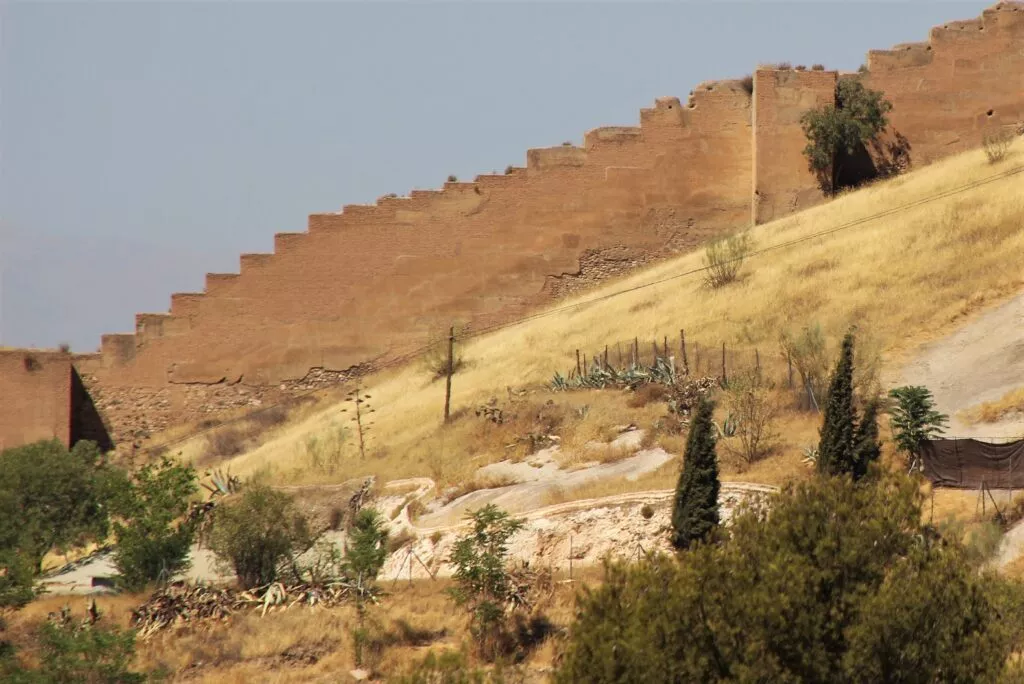
The Zirids are members of a Berber tribe from Kabylia. They were the originators of the Alcazaba in Malaga, the Alhambra Palace and the Albayzin district in Granada.
Another beautiful Alcazaba was built by the Zirids, which you can see if you plan to visit Guadix.
After the fall of the Caliphate of Córdoba, these Berbers were also the founders of the first kingdom of Granada.
Note: at the following link you can book several private guided tours of Granada in English.
Where to see a flamenco show in a cave house in the Sacromonte?
The Sacromonte of Granada is considered to be one of the birthplaces of flamenco. You will probably hear the term ‘zambra’ used to describe the flamenco danced in this area.
This term comes from the Arabic-andalusian language, from the word zámra. The word zámra comes from the Arabic language: zamr which means ‘toccata’.
Here are 4 places to see a flamenco show in the Sacromonte neighbourhood
The Museo de la Zambra
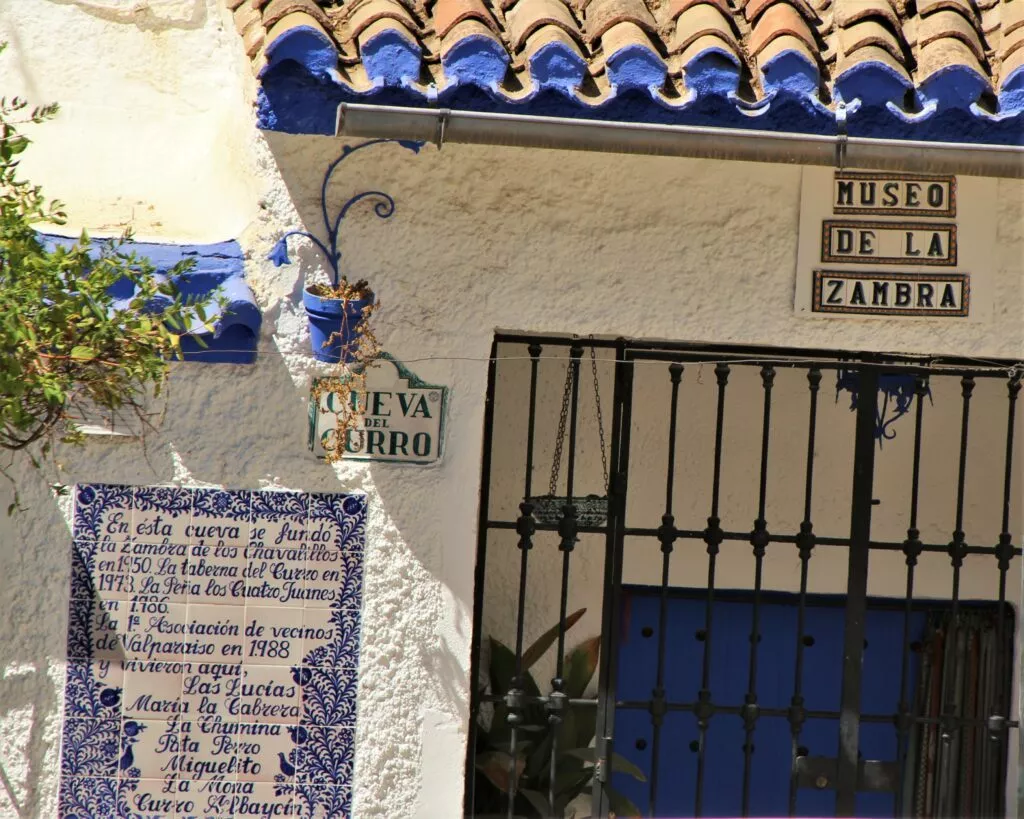
This museum-cave is also named after Maria de la Canastera. She was one of the greatest flamenco dancers of Sacromonte and more generally of Granada.
In front of this cueva you have an incredible view of the Alhambra in the background:
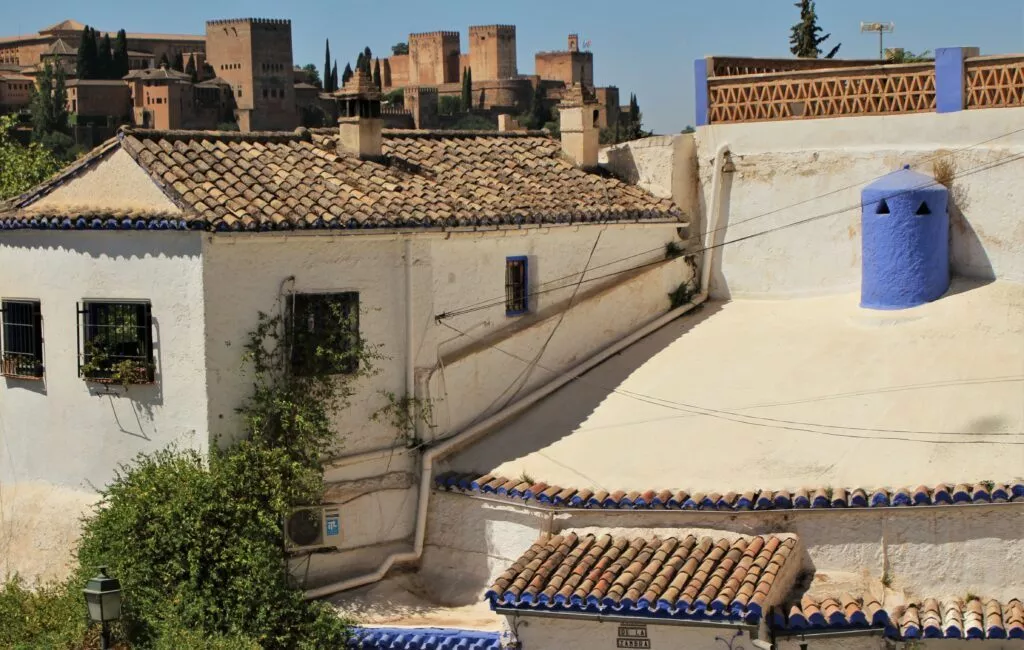
Shows have been given here since its creation in the early 1950s.
Many celebrities have passed through here: the King of Belgium, King of Spain, King Hussein of Jordan, Duke of Winsdor. But also some very famous writers and actors: Ernest Hermingway, Anthony Quinn, Ingrid Bergman, Claudia Cardinale, Henry Fonda, Alain Delon, Ornella Mutti, Telly Sabalas, Joseph Cotten, Yull Brunner.
Venta el Gallo
Flamenco shows are given in the evening as in the other caves. Here, too, the proximity to the artists allows you to feel the passion they have for their art.
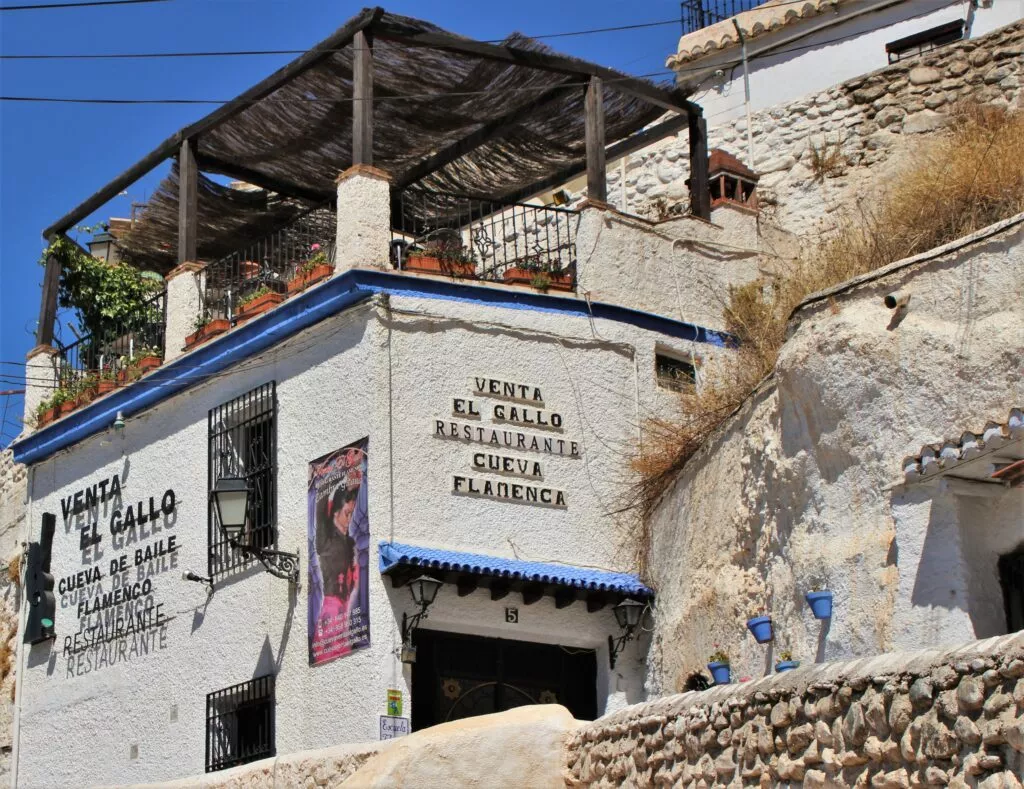
Cueva de la Rocio
The Cueva de la Rocío was in 1951, becoming one of the first gypsy zambras in Sacromonte.
Note: The zambra has become a name that defines several things: the party, a type of flamenco dance, a place for dancing. Originally, the zambra was only danced at gypsy weddings.
Every evening there are flamenco shows. There is also a terrace and a restaurant.
Cueva de los Tarantos
The Cueva de los Tarantos is one of the most famous gypsy caves for its flamenco nights. Performances have been held here every evening since 1972.
This Cueva offers the possibility to book online: Flamenco in Cueva de Tarantos
Below you can watch a short film of the shows given in this tablao.

If you choose to visit Granada without a guide, here is a great idea to relax in a beautiful place after the city tour (…and the heat of the day): booking for the hammam. It is located not far from the Alhambra.
What to do in Granada?
Here are some ideas for activities and visits, classified by theme. You can book them online today.
Bonus: all activities can be cancelled up to 24 hours before the scheduled date:
Note: here is also a link for those looking for outdoor activities to do from Granada.
In the event that you are on holiday on the “Costa del Sol Oriental”, the eastern part of Malaga.
From your place of stay between Nerja and Torre del Mar, a great guide will organise a day trip to discover the Alhambra palaces and the Albaicin quarter. This tour is done in semi-private groups (2 to 8 people maximum).
To access the details of the day, the price and to book online, just click on : Semi private tour to Alhambra and the Albayzin from Nerja and Torrox.
If you are in the western part of the Costa del Sol and would like to visit Granada, you can use the following link to book a day trip from Torremolinos, Mijas or Benalmadena.
Find accommodation in the centre of Granada or in the Sacromonte neighbourhood
See the offers for a stay of one or more nights
And for lovers of spanish cuisine here a dedicated formula for the stay in Granada : 7 Day Spanish and Cooking Course in the City of Granada.
Some useful links (car hire, other ideas for visits)
After visiting the Sacromonte, just next door, there is the fabulous Albaicin neighbourhood in Granada, a World Heritage Site.
Easy and economical bookings
If you are in Andalucia as part of a tour with several major cities to visit, here are some links that may be of interest:
Seville
Seville, the capital of Andalucia, is a city full of treasures to discover and monuments to visit.
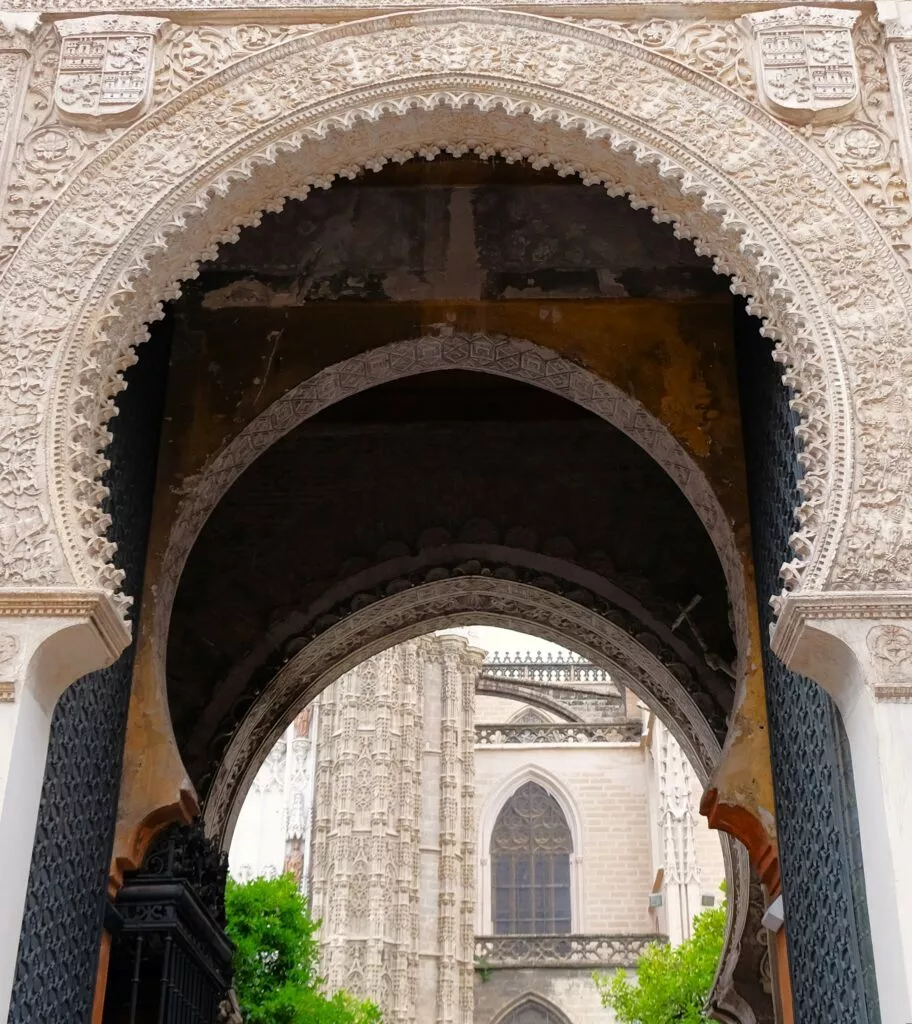
Here you will find everything you can see in Seville in 3 days. And for those who will stay longer you will also find information on secret Seville and the Santa Cruz and Triana districts.
Cadiz
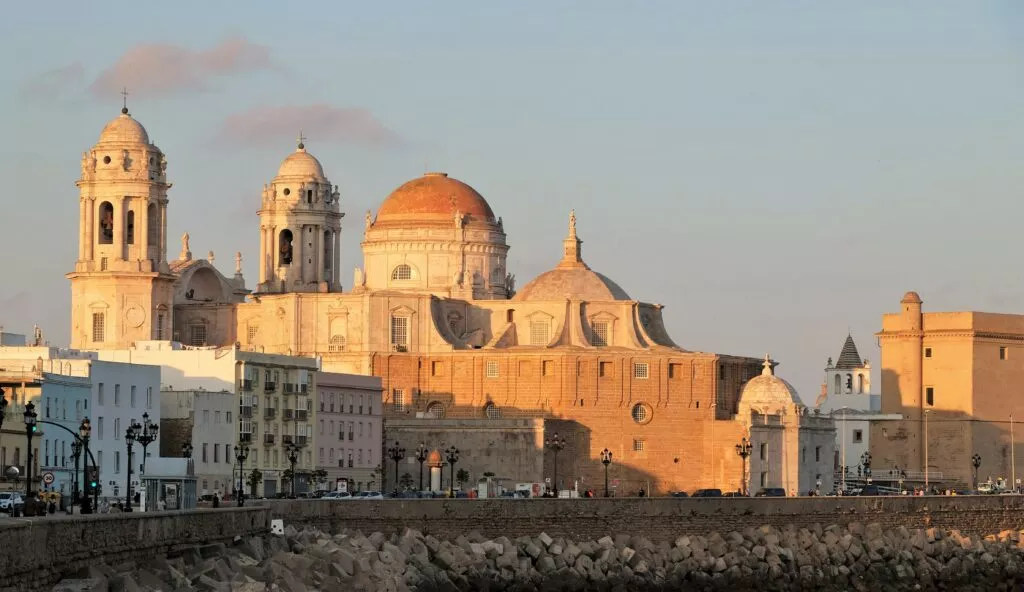
Visit Cadiz, a city with an incredible past and great beauty, on the Costa del la Luz.
Malaga
When you reach the Costa del Sol you will find in this link all must-sees in Malaga :
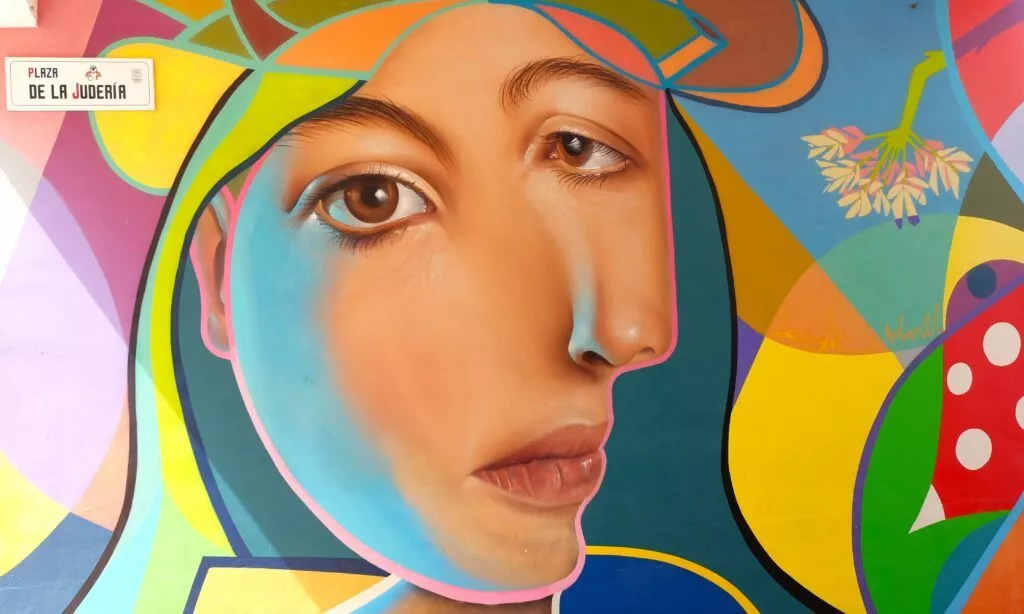
Cordoba
And of course, visit Cordoba, the caliphate city, and the Juderia district
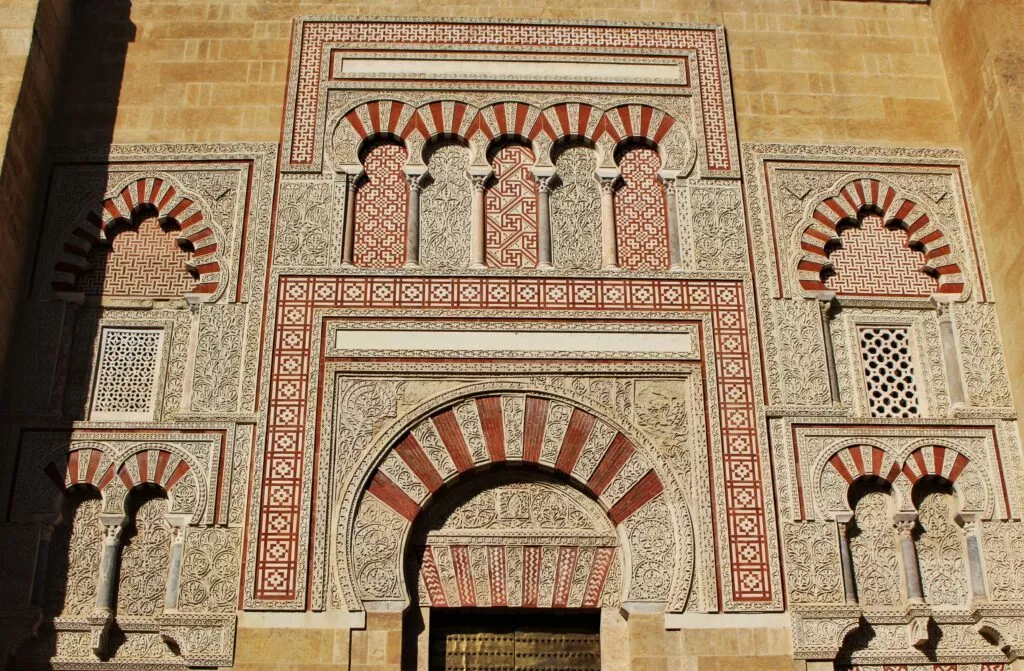
Discover other beautiful sites in Andalusia in the pages of the blog on Andalucia.
Here is the link to receive our newsletter from the andaluciamia.com blog
The latest articles on Andalucia
-
Interactive map of Andalucia with best places to see
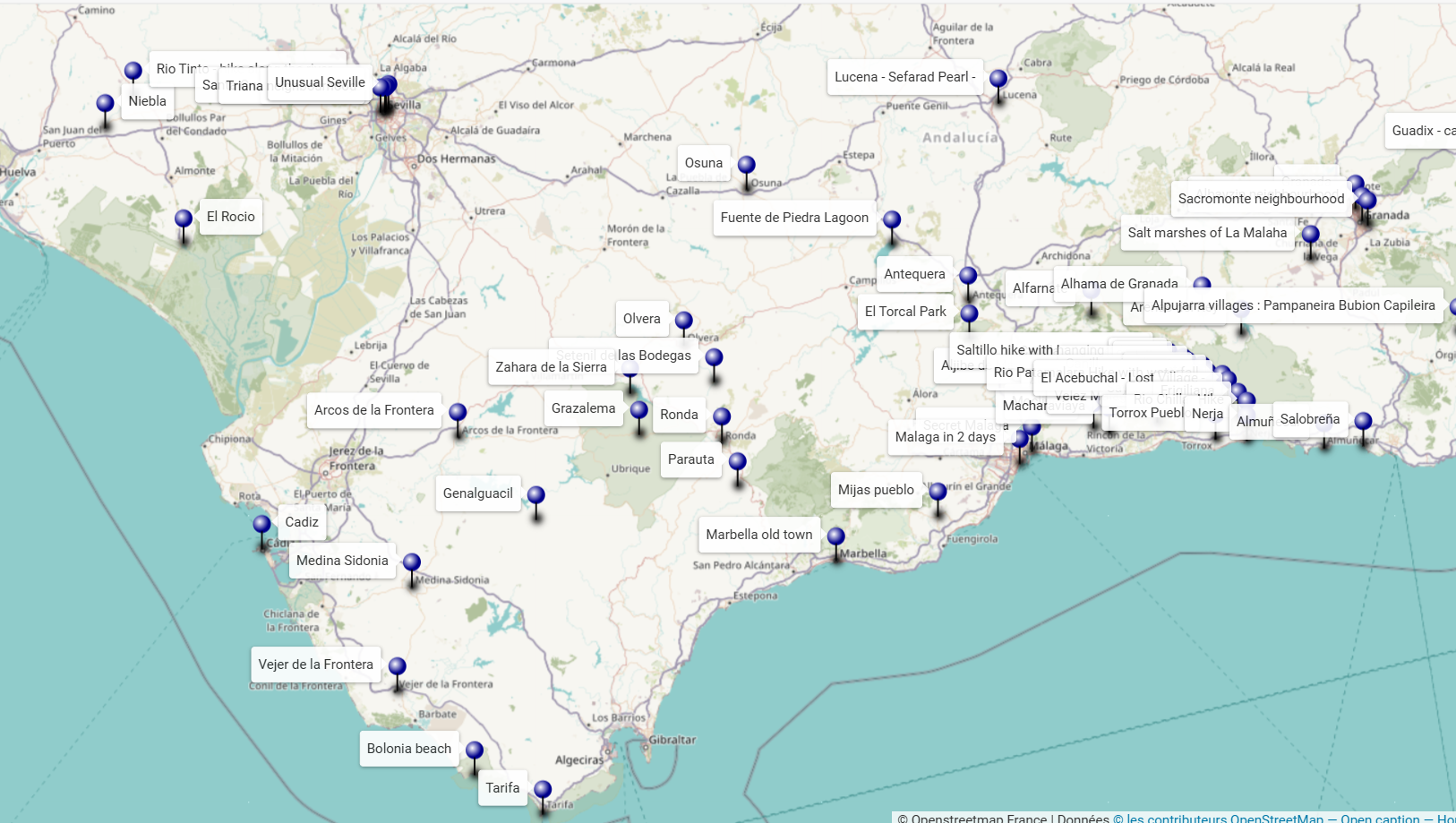
An interactive map of Andalucia to discover the sites to see around your holiday destination or to prepare a tour or road-trip.
-
Andalusia off the beaten track : 18 gems
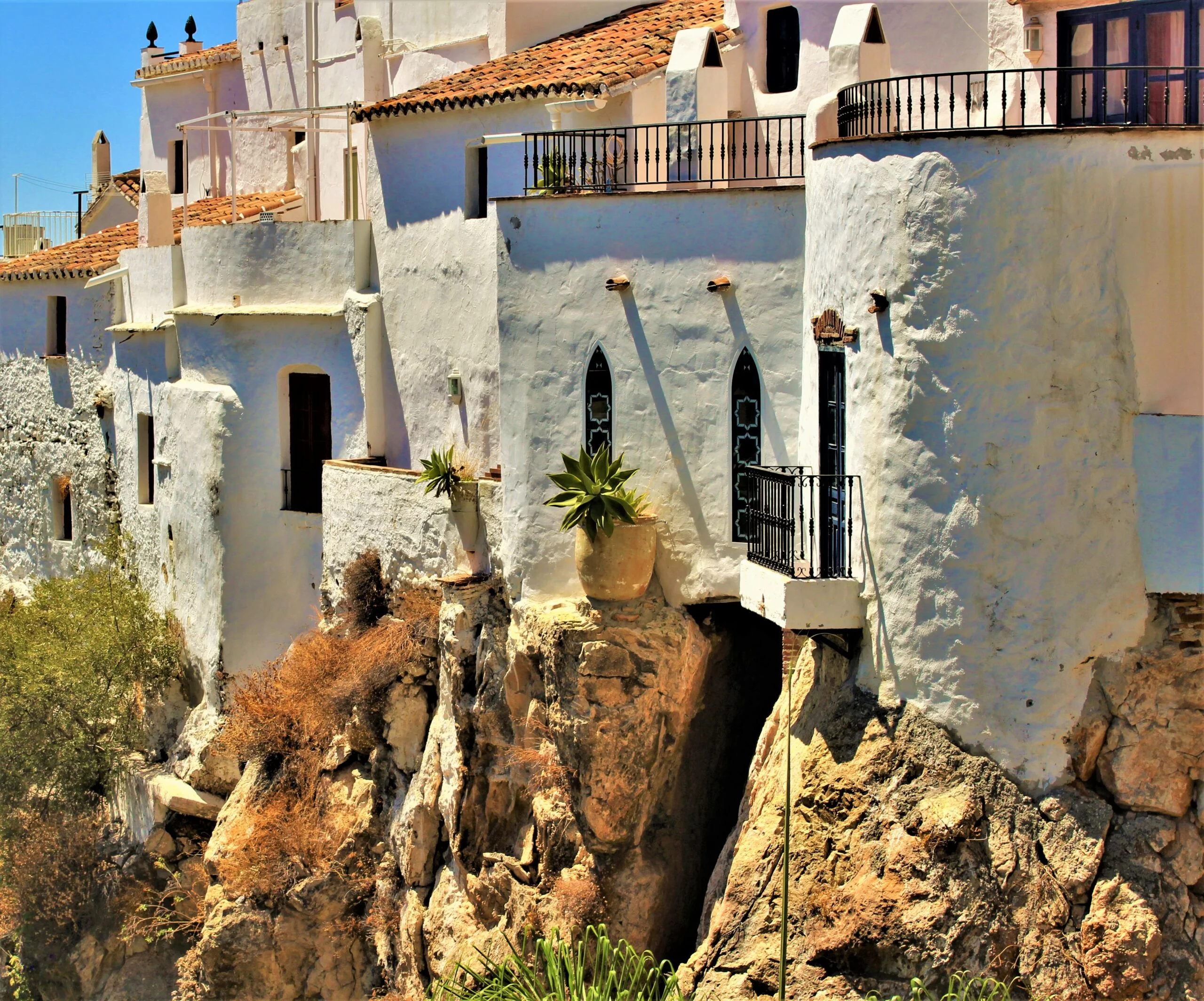
Let’s immediately set off to discover an Andalusia off the beaten track. There are many wonders to discover.
-
19 Most beautiful white villages in Andalusia
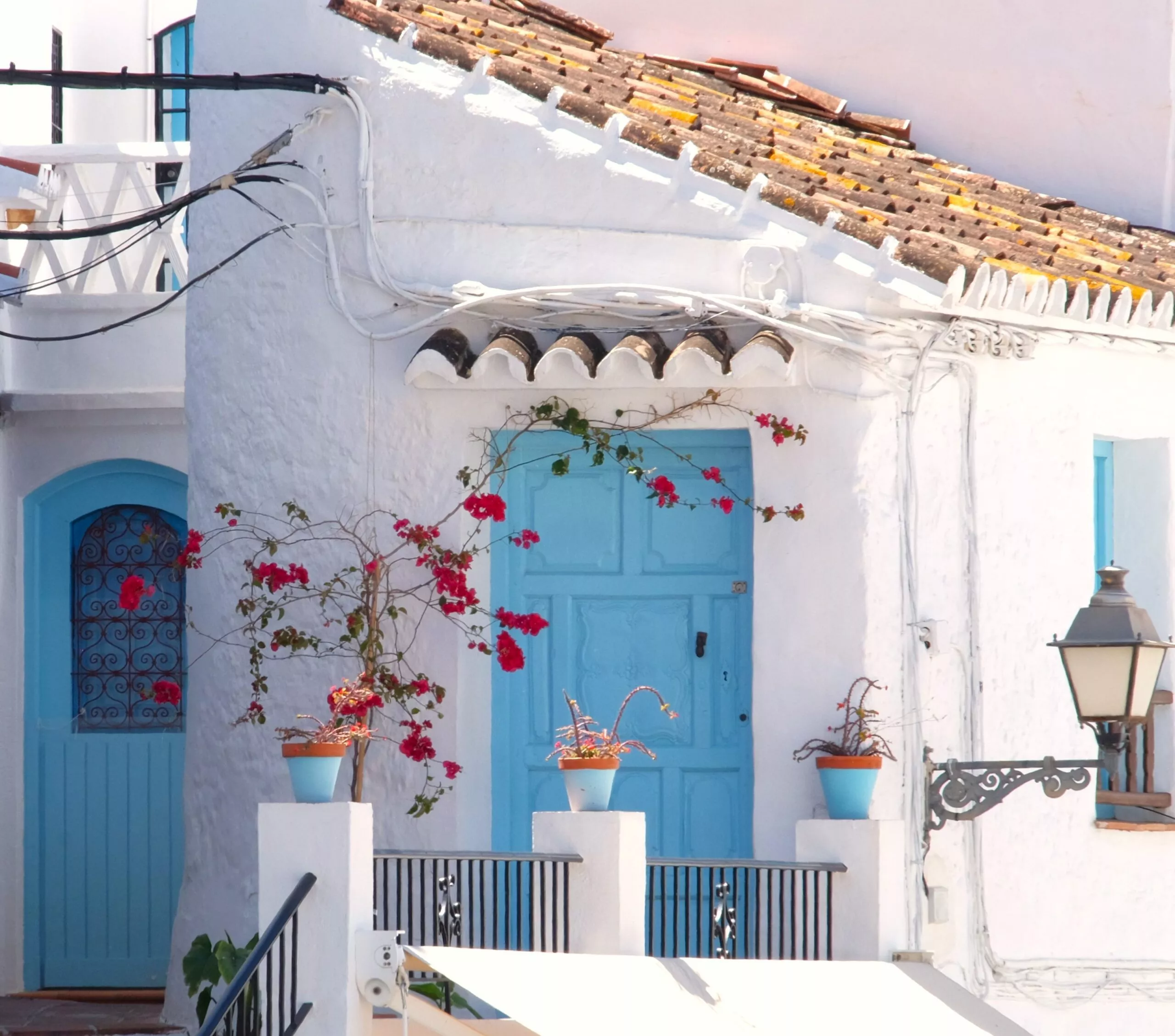
Discovering the most beautiful white villages of Andalusia. These villages are the only ones to be part of the Pueblos más bonitos de España.
-
Unusual Andalusia – 15 Very Surprising Places –
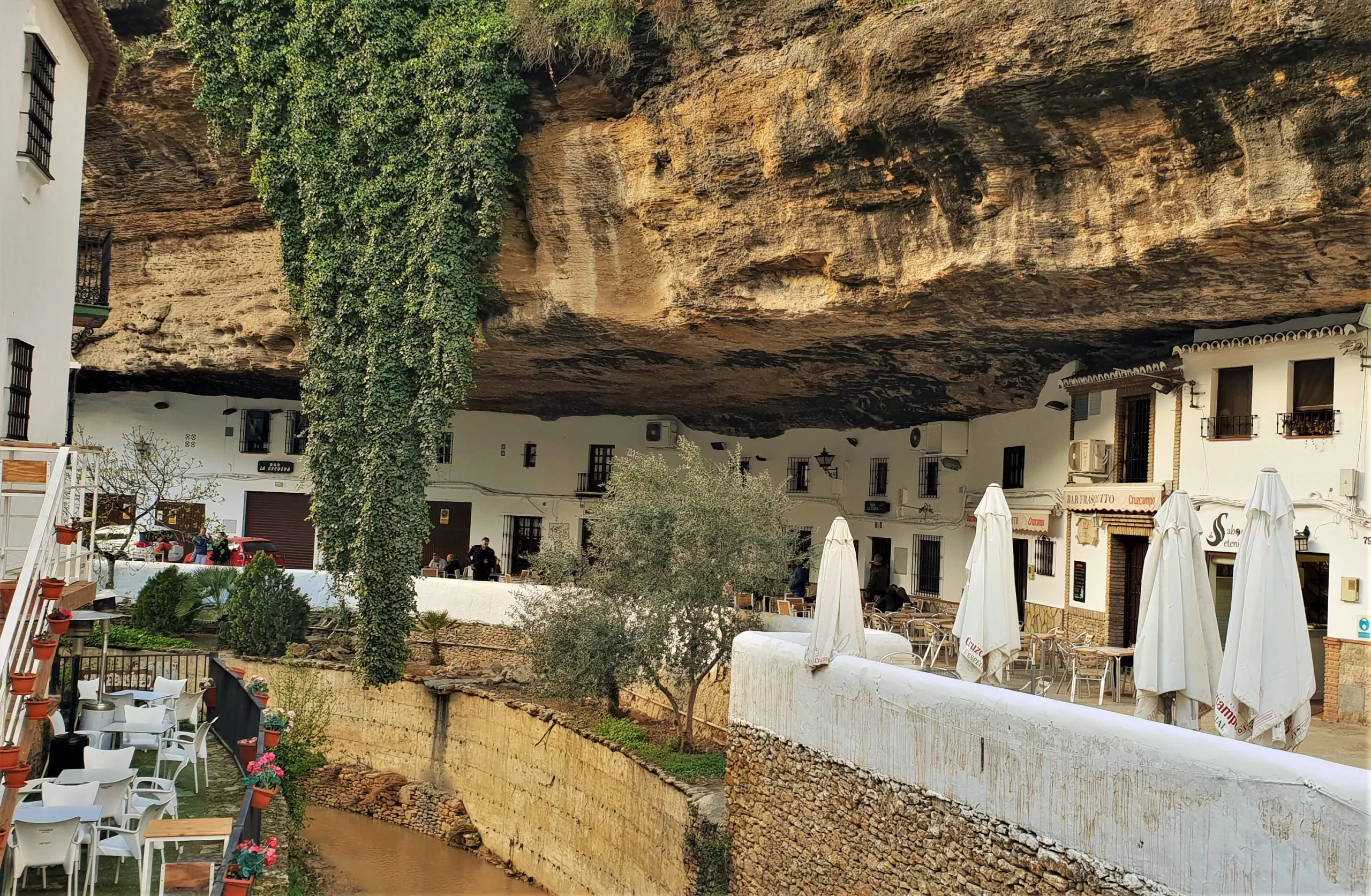
Unusual Andalusia: discover the most surprising and wonderful places in southern Spain.
